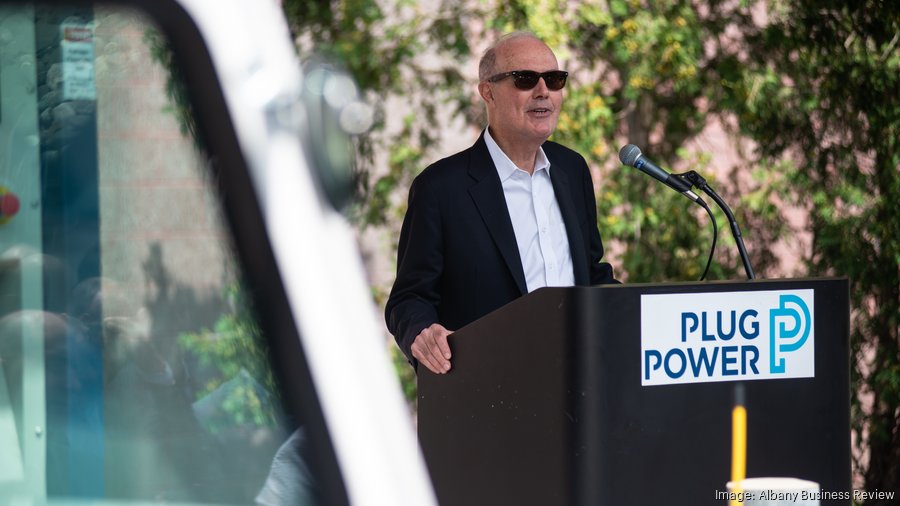Plug Power has been trying to diversify its products for years, and on Thursday the fuel cell manufacturer showed off one of its latest projects — powering FedEx airport ground equipment trucks.
FedEx has been running the vehicles — called tuggers — with Plug fuel cells for months at the Albany International Airport, surviving temperatures as cold as 4 degrees Fahrenheit and as hot as 90 degrees Fahrenheit.
The challenge now is getting the fuel cell engines for airport ground equipment to market. It is one of the first signs that Plug is diversifying beyond its core market of fuel cell engines for forklifts in warehouses.
"You'll see in the coming months other announcements in this program of a global nature," Andy Marsh, CEO of Plug Power, said in an interview with the Business Review. Plug Power hosted a demonstration of fueling an airport ground support truck at its headquarters in Latham on Thursday.
"Because of this climate change conversation, there's places in Europe where this is attractive, because the pressures for reducing the carbon footprint at airports are much more intense there than they are here today," Marsh added.
Plug Power is working with Charlatte America on the current project. The company, a member of the Fayat Group, is a large manufacturer of battery-powered electric airport ground support equipment. Charlatte America built the ground support vehicles and they run on Plug Power’s zero-emission hydrogen engines.
Marsh said the key to getting the fuel cell engines to a wider market will be working with manufacturers like Charlatte because airport sales channels are complicated.
In the pilot stages of the project, the tuggers are bringing FedEx packages from the sorting facility at the Albany airport to delivery airplanes. They can tow up to 40,000 pounds, without stopping, for up to four hours and require three to four minutes for refueling.
FedEx previously used diesel-powered cargo tuggers. Plug Power says the new version has fewer demands for maintenance such as oil changes, brakes and starter replacements. The tuggers were also piloted at Memphis International Airport in Tennessee, where FedEx is headquartered.
Following the pilot phase of the project, Plug said FedEx intends to keep using the fuel cell-powered ground equipment. Marsh declined to give any hints about whether FedEx will expand the program with Plug to more airports.
The primary business for Plug Power (Nasdaq: PLUG) has been making hydrogen fuel cells that power forklifts in warehouses and distribution centers. The fuel cells are an alternative to lead-acid batteries.
Plug has shipped more than 28,000 fuel cells to dozens of customers, including Amazon (Nasdaq: AMZN) and Walmart (NYSE: WMT). And it has become the world’s largest user of liquid hydrogen, with 15 tons used daily, surpassing NASA.
But Marsh has been mapping out a diversified future for Plug Power. Last year, it started a pilot program in which electric FedEx trucks delivering packages in the Albany area were outfitted with hydrogen fuel cells.
Plug also acquired EnergyOr, a Montreal-based company, in the second quarter of 2019 that will help Plug move into new markets such as robotics and drones.
The first half of the year is often slower for the company, with revenues and orders rising in the second half of the year. But Plug Power reiterated that it expects gross billings between $235 and $245 million for this year, as well as positive EBITDA for 2019.
Plug's stock was selling at $1.95 on Tuesday afternoon.






